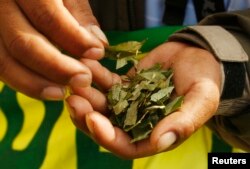Coffee producers in Peru are abandoning their farms to work on plantations that grow coca, the main ingredient in cocaine, due to slumping coffee prices and delays in certifying organic beans, the country's main coffee association said on Monday.
The group, the Junta Nacional del Cafe (JNC), said farmers starting migrating to drug-trafficking regions in December to work on coca plantations, where they can earn higher pay of between 70 and 120 soles ($21 and $36) per day.
The pace has picked up since then, with hundreds of farmers abandoning their coffee crops daily, the JNC said.
"Coffee ... exports are in real trouble, and we lack the support of the government with clear actions to overcome them," said the JNC's head, Tomas Cordova. "This foments poverty, unemployment and the expansion of illegal crops."
Devida, Peru's anti-drug agency, did not immediately respond to a request for comment.
The trend would mark setback for efforts to combat drug trafficking in Peru, a leading producer.
Peru and the United States have spent years investing in programs aimed at helping coca farmers switch to alternative crops, mainly coffee and cacao. But potential cocaine production in Peru rose 20 percent to a 25-year high of 491 tonnes in 2017, according to a White House report in November.
Coca cultivation rose 14 percent to 49,900 hectares (123,300 acres) in 2017 as the price of coca leaf rose and eradication fell, according to a joint report in December by the United Nations and Devida.
The JNC called for the government of President Martin Vizcarra to do more to help coffee farmers keep up with global trends. It said that last year, sales of organic coffee in Germany were suspended pending certificates showing beans did had no traces of agrochemicals.
Last year, Peru produced 6 million 46-kilo bags of coffee, most of which was exported, JNC said.
While Peru's coffee production lags behind neighboring Colombia and Brazil, it has carved out a niche as an organic producer.











